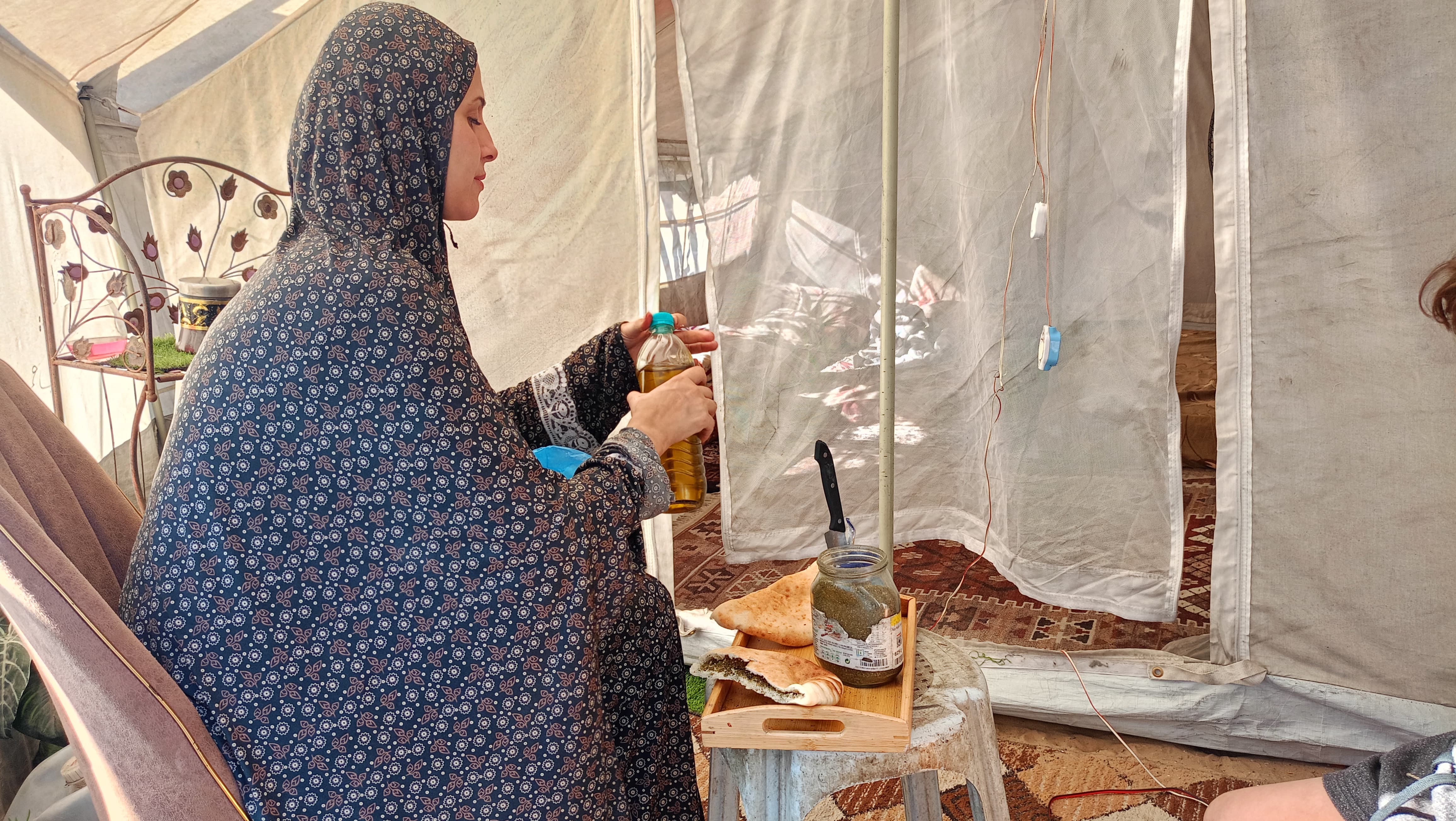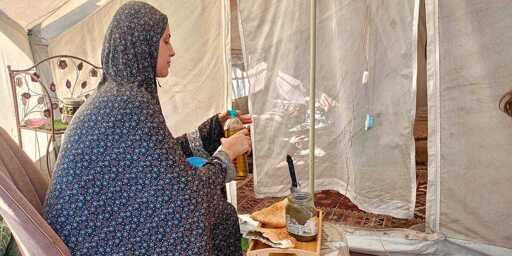Journalist Rasha Abou Jalal was forced to leave where she was staying in Gaza City to a tent in the western part of the city last month, as the Israeli military launched a brutal offensive to seize and ethnically cleanse the city of Palestinians. She was determined to stay in the city with her husband and five children, despite the Israeli assault. But as Israeli tanks, troops, and quadcopters closed in—the health care system collapsing—their family was forced to flee last week. They made the arduous trek to Nuseirat in central Gaza on foot.
Abou Jalal and her family are now living in a tent by the side of the road. She said her new circumstances make it even more difficult to do her work. “We have no electricity and I really struggle to charge my laptop and phone. Every day, I send my devices to a charging point about 300 meters away, and it takes around six hours to charge them. This greatly hinders my journalistic work and my communication with others. The same goes for the internet. I do not have a phone that supports an eSIM, so every day I walk about half a kilometer searching for an internet connection to follow up on my work,” she said.
The story you are about to read is Abou Jalal’s account of her own displacement. Hundreds of thousands of Palestinians have been forced to flee Gaza City over the past month.
– Sharif Abdel Kouddous
 Journalist Rasha Abou Jalal prepares sandwiches for her children in her tent in western Nuseirat in central Gaza after her family’s forced displacement from Gaza City. September 20, 2025. (Photo by Abdullah al-Turkamani.)
Journalist Rasha Abou Jalal prepares sandwiches for her children in her tent in western Nuseirat in central Gaza after her family’s forced displacement from Gaza City. September 20, 2025. (Photo by Abdullah al-Turkamani.)
Story by Rasha Abou Jalal
Last week, I was standing with several of my neighbors in our tent encampment in western Gaza City as we discussed the importance of remaining steadfast and staying in the city, despite Israel’s plan to seize control and empty the place of its residents. It was then that an Israeli airstrike landed nearby with deafening force, turning our gathering into a scene of overwhelming panic and fear.
My six-year-old daughter, Hour, had been playing in front of our tent, but when I looked over, she had been hit by shrapnel and had blood pouring from her nose. I rushed to her in a state of terror and tried to figure out the extent of her injuries. She appeared stable, but there was blood gushing from a wound in her nose.
 An Israeli airstrike in western Gaza City near the tent encampment where Rasha Abou Jalal and her family were living. September 16, 2025. (Photo by Rasha Abou Jalal.)
An Israeli airstrike in western Gaza City near the tent encampment where Rasha Abou Jalal and her family were living. September 16, 2025. (Photo by Rasha Abou Jalal.)
My husband decided to take her to Al-Shifa Hospital, which was once the largest hospital in Palestine, but after being attacked and raided by the Israeli military several times, it’s now a shadow of its former stature—with only a few buildings partially standing.
When they arrived, my husband found the hospital crammed with the wounded from Israel’s relentless bombing campaign across the city. There were patients everywhere strewn in the halls and overflowing outside.
He waited for four hours before he could see a doctor, holding a piece of tissue to our daughter’s nose as he waited. After the long wait, the doctor said Hour would need stitches to close up the wound. Then came the shocking news: the doctor told my husband he would have to go find a pharmacy and buy the stitching thread, iodine, and gauze, because the hospital did not have these most basic of medical supplies.
 Rasha Abou Jalal’s daughter Hour, 6, after being treated for a shrapnel injury to her nose. September 16, 2025. (Photo by Rasha About Jalal.)
Rasha Abou Jalal’s daughter Hour, 6, after being treated for a shrapnel injury to her nose. September 16, 2025. (Photo by Rasha About Jalal.)
That was the turning point. We had been firm in our stance that we would not leave the city. But if the main hospital in Gaza couldn’t provide stitches and gauze to patch up a small injury, how would we manage if one of us was severely wounded? It was then that my husband and I decided that staying in this city was no longer viable. We had to become displaced to the south; there were no longer any means of sustaining life in Gaza City with our five children.
Later that evening, as I was preparing the bedding for my children, I heard a great commotion outside the tent. Families in the neighborhood were running and trying to hide from Israeli quadcopter drones, which were firing randomly at everything that moved.
Everyone in the area began dismantling their tents to flee to the south. Remaining here was not an option. There was no time left.
We spent our last day in Gaza City inside an abandoned house across from our tent, which had been struck with several bullets from quadcopters. Then, at 4 PM, when the scorching heat of the day had subsided, we began our journey southward.
We could not take most of our belongings with us, since we didn’t have any means of transporting them. We tried again and again to find any kind of ride, but drivers refused to enter western Gaza City due to the intensity of the bombardment.
What was even worse was that, even if we could find transportation, we couldn’t afford it. The fare for a family to be taken to the south is now at least $1,500 for a journey; it used to cost $50 at most before the war.
We had no choice but to flee on foot. My children carried backpacks containing water, food, and some clothing, while my husband and I carried a few blankets and mattresses, as well as our worn-out tent, which had become our portable home.
The journey was extremely difficult. There was destruction and rubble lining both sides of the road, while trucks laden with belongings and displaced families clogged the middle. We walked for seven hours over 15 kilometers (about 10 miles).
We stopped every hour for a short rest to eat biscuits and drink water. Stray dogs roamed the road, sometimes blocking our way and frightening the children. The men would chase them off and clear the path. There were hundreds of families like us, making the same trek to the south.
My eldest daughter, 13-year-old Saida, asked me, “Mama, will we go back to Gaza City again?” I told her, “Of course we will return,” even though I had no idea if we ever would.
We arrived in the western part of Nuseirat in central Gaza. The ongoing Israeli airstrikes felt relatively distant from us.
We tried to find an empty space to set up our tent and get some sleep and rest, but there was no place in any of the shelter centers. We had no choice but to pitch our tent on a side street close to a shelter center.
I found myself living like a homeless person on the street, with vehicles passing near and spewing suffocating exhaust just meters away from me. I did not care about any of that. All I wanted, at that moment, was to get some sleep—to get some kind of rest after our exhausting journey.
From Drop Site News via this RSS feed


